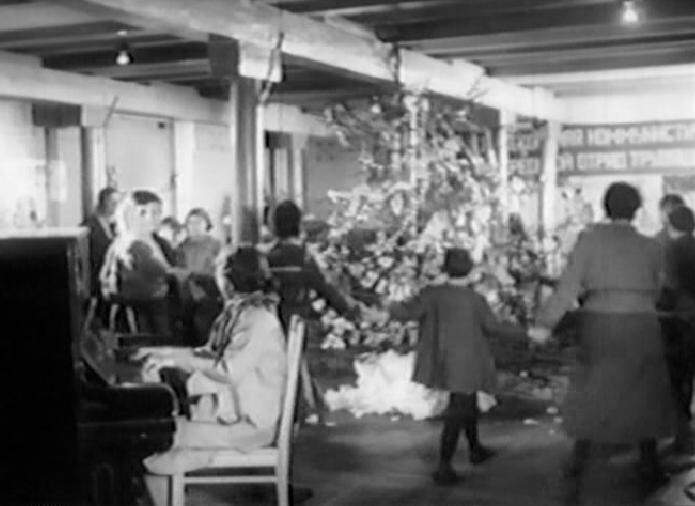
World War II: Moscow Saved (December 1941)

Figure 1.--Here is a New Years' celebration in a Moscow shelter after the German armies had been smashed before the city in a surprise Siviet Wintr offensive. The citizens of Moscow could afford a brief celebration. Notice the decorated tree, like a Christmas tree, but actually for New Years. The children are dancing around the tree to the accompaniment of piano music. The boy in the foreground wears a smock, apparently, over his normal street clothes. He wears short pants (which the smock covers) and long black stockings. Long stockings were normal boys' dress in
Russia during the winter months. This of course would be very early January.
|
|
The Red Army offensive saved Moscow. The Germans were driven back well out of artillery range. The City would never again be threatened by the Wehrmacht. The front stabilized well west of the city. There were bomber raids, but the Luftwaffe as shown in the Battle of Britain had a limited strategic boming capability. The people that left the City gradually returned. There were various celebrations. any small family, school, or other New Years celebrations were held. Communist authorities had for several years been promoting New Years instead of Christmas. Moscovites were releaved, but few yet realized what would have befallen them had the NAZIs succeeded in taking the City. The Red Army drove long lines of German POWs through the City on the way to the Gulag camps in the east. Few would ever return to Germany. The Russians called them Frozen Fritzes.
The desisive battle of Barbarossa and arguably the entire War was fought before Moscow during the Winter 1941-42. The Japanese decission to strike America, allowed the Soviets to shift Siberian reserves. A Japanese spy in Tokyo had informed Stalin well before the actual attack on Pearl Harbor. These troops, well trained in winter warfare, on December 6, 1941 launched a winter offensive stopping the Whermacht at the gates of Moscow--inflicting irreplaceable losses.
The Red Army offensive saved Moscow. It was the Wehrmacht's first major defeat of the War. Until the RedArmy offensive, many had questioned its ability ro resist the Germans. The Germans were driven back well out of artillery range. The City would never again be threatened by the Wehrmacht. The front stabilized well west of the city. There were bomber raids, but the Luftwaffe as shown in the Battle of Britain had a limited strategic boming capability.
Evacuees Return
The people that left the City gradually returned.
Celebrations
There were various celebrations. Many small family, school, or other New Years celebrations were held. Communist authorities had for several years been promoting New Years instead of Christmas. Moscow was able to go ahead with the planned celebrations its winter holiday. Moscovites were releaved, but few yet realized what would have befallen them had the NAZIs succeeded in taking the City.
German POWs
The Red Army drove long lines of German POWs through the City on the way to the Gulag camps in the east. Few would ever return to Germany. The Russians called them Frozen Fritzes. The NAZIs treated the Soviet POWs with genocidal disregard. The Soviets answered in kind, althiugh the Germans probably survived longer in the Soviet Gulag than the Soviets did in the SS camps.
HBC

Navigate the Boys' Historical Clothing Web Site:
[Return to Main Moscow page]
[Return to Main World War II campaign page]
[Introduction]
[Activities]
[Biographies]
[Chronology]
[Clothing styles]
[Countries]
[Bibliographies]
[Contributions]
[FAQs]
[Glossaries]
[Satellite sites]
[Tools]
[Boys' Clothing Home]
Created: 6:16 AM 3/9/2007
Last updated: 6:16 AM 3/9/2007



